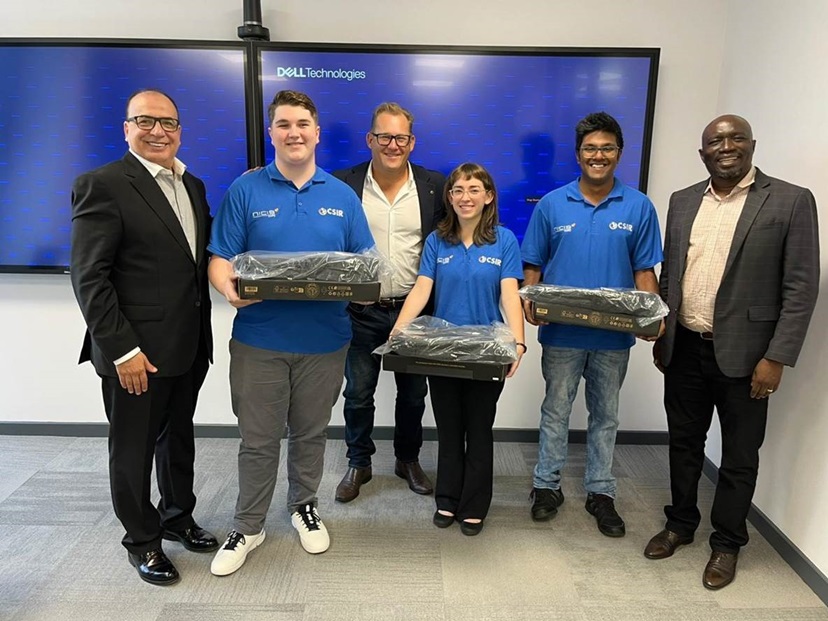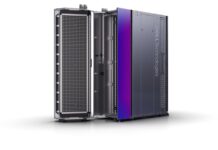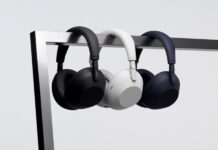The Council for Scientific and Industrial Research (CSIR) and Dell Technologies South Africa have announced a Student Cluster Competition set to empower the next generation of tech innovators. During the course of the competition, undergraduate students will develop the capability to build small-scale high performance computing clusters.
Sponsored by Dell Technologies South Africa, the Student Cluster Competition is an exciting opportunity for undergraduate students currently enrolled in Science, Technology, Engineering and Mathematics (STEM) fields at South African universities.
Caption: From left to right: Mohammed Amin (Senior Vice President for META Region, Dell Technologies), Reinhard Janse van Buren (Wits University student), Doug Woolley (General Manager, Dell Technologies South Africa), Lily de Melo (Wits University student), Mikyle Singh (Wits University student), and Dr. Happy Sithole (Centre Manager, CSIR-NICIS). Dell Technologies, proudly sponsored laptops and bags for the Student Cluster Competition winners at Krugergate. CSIR-NICIS, with support from Dell, ensures these students receive top-notch training at Dell facilities, emphasising their commitment to nurturing future tech talent.
“Dell Technologies is an important strategic partner for the CSIR, and specifically National Integrated Cyber Infrastructure Systems (NICIS). We value our mutually beneficial partnership with Dell Technologies as it impacts the capability of South Africa as a whole,” says Dr Happy Sithole, Centre Manager: National Integrated Cyber Infrastructure at CSIR-NICIS.
Ten teams of undergraduate students from several universities and institutions of higher learning from all around South Africa will put their skills to the test in the Student Cluster Competition, building small-scale (3 – 4 compute nodes) high performance computing clusters with hardware sponsored by Dell and supported by various NICIS partners. There are four undergraduate team members and a mentor (postgraduate or member of staff) in each team.
The students will be tasked with assembling, configuring and deploying all the components (hardware and software) necessary to develop a functional high performance cluster. Once all the aspects of a usable cluster are in place, the teams will proceed to run several application benchmarks on their small-scale clusters. The challenges are devised to give the students real-world exposure to solving real-world problems.
“The students will be faced with a diverse and broad range of challenges from a vast array of interdisciplinary fields, including climate change, physics and engineering design problems, modelling billions of years of the evolution of the universe and simulating a quantum computer,” Dr Sithole says.
Of the 40 students participating, the winning team and four additional students are given the opportunity to extend their training further at the Texas Advanced Computing Centre at the University of Texas, and at Dell Labs in Austin, Texas. They also win the opportunity to travel to Hamburg in Germany to participate in the International Super Computing Student Cluster Competition.
“As you can see, the students are competing for a rare opportunity to develop much sought-after skills,” Dr Sithole says. “The winners will also derive huge benefit from the high-value experiences mentioned above.”
Doug Woolley, General Manager of Dell Technologies South Africa, says: “It is an honour to collaborate with the CSIR and NICIS. This partnership offers Dell an exciting opportunity to help empower our future generation through training in the critical STEM fields, so that they may be the leaders of tomorrow.”
Article Provided




























